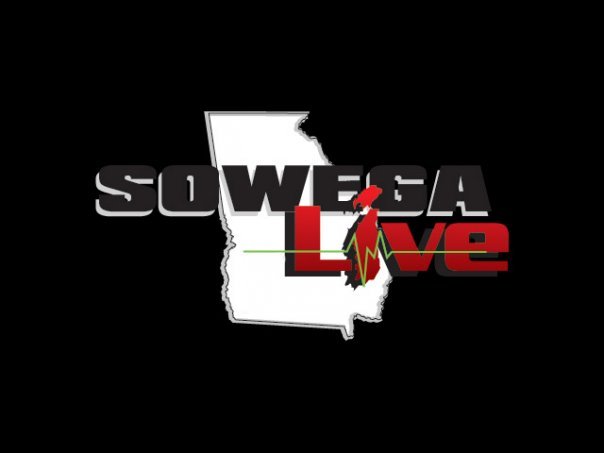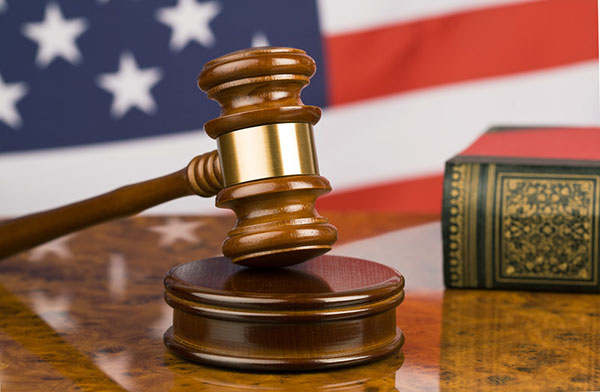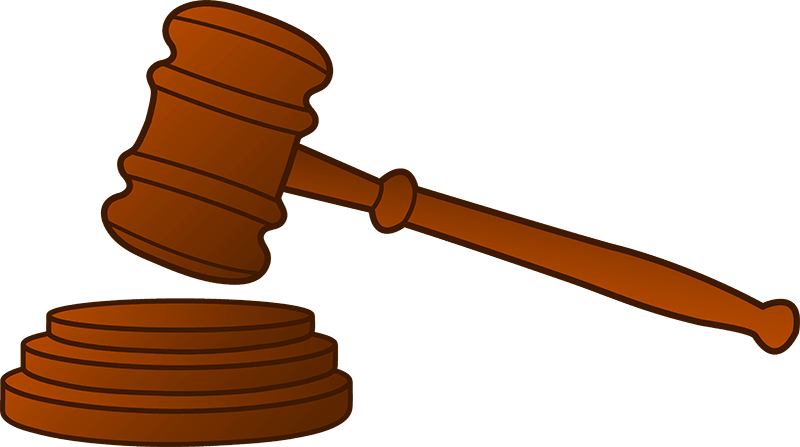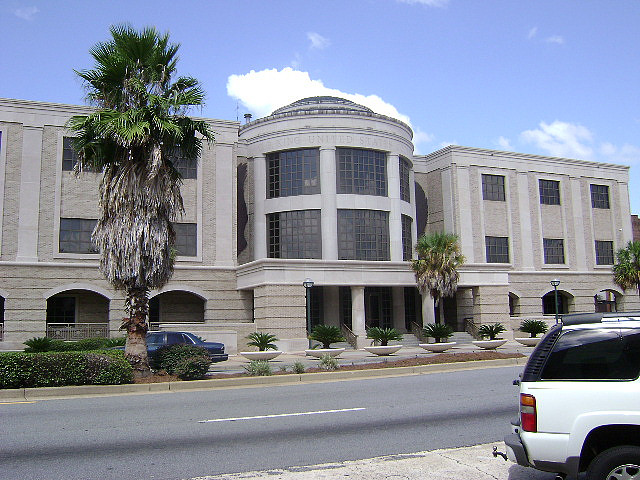
The following is a summary of the trial of United States vs. Wiley Griffin et al. We are attempting to be as accurate as possible in reporting the trial, given the restrictions on recording equipment within the courtroom. The article contains statements and claims made in court by attorneys and witnesses during the course of opening statements and testimony. Those statements and claims do not represent the views or opinions of Sowegalive.com or its parent company, Flint Media Inc.
After questioning of FBI Special Agent Steve McDermott concluded Wednesday, prosecutors called three additional witnesses: Norma McIntyre, who was working as a volunteer security guard at Bainbridge Bikefest on the night in question; Autumn Webster, an attorney who represented Aaron Parrish when he was charged with obstruction of law enforcement; and District Attorney Joe Mulholland, who prosecuted Parrish in the February 2013 trial in state court.
Mulholland was called as a witness just ten minutes prior to Judge Sands ending the jury’s day at 2 p.m., so we will include his testimony in Thursday’s article. This article will cover the testimony of Norma McIntyre and Autumn Webster.
Norma McIntyre said she had worked as a volunteer at Bikefest between 2009-2013, including the 2012 Bikefest. McIntyre and her husband, Anthony, were working Bikefest security as volunteers on the night of the incident. McIntyre said Bikefest security guards wore bright green T-shirts with the word “Security” printed on them. The volunteers also have two-way radios to communicate with each other, but do not carry weapons.
Shortly after midnight on that Saturday night at Bikefest, McIntyre and her husband responded to Don Green’s camping area, after being told a person they were looking for in relation to a fight elsewhere on the grounds might be located there. Initially, she was directing traffic on the road near the camper, so that other security could get through, while her husband searched for the man they were looking for.
Not long after, McIntyre heard a commotion coming from the area of Don Green’s camper and walked over to it. When she arrived, she saw her husband and Bikefest security chief Robby Lynn Webb talking to a man and his wife, who they later learned was Mike Green and his wife Mandy.
Earlier in the trial, Jeanne West–Aaron Parrish’s mother–had testified she and her husband, Mark West went over to where the Greens were talking behind Don Green’s camper in attempt to see if they were OK. When the Wests were unable to calm things down, Mrs. West recalled motioning her husband away from behind the camper and saying that the Wests leave the Greens alone and go elsewhere.
McIntyre said that when she arrived and saw the Greens at one end of the camper, she also saw Sheriff’s deputies helping another man to his feet after what she assumed was an altercation. She said the deputies sat the man down on a cooler, but wasn’t sure if he was handcuffed.
According to McIntyre, Mike Green said he knew the people involved in an earlier altercation and wanted to walk to the other end of the camper to check on them. However Bikefest security and Sheriff’s deputies told Green he could not go over to where deputies were dealing with the prior incident and he began resisting.
McIntyre said Green became more physical and saw him swing his hand around with a closed fist, apparently in an attempt to punch Kines, who had just told Green he needed to leave Bikefest. However, Green struck Deputy Croley with “a glancing blow” on her shoulder, according to McIntyre. Kines then took Green to the ground, she testified.
“They all tripped and fell and wound up on the ground,” McIntyre testified. “Mike Green was on the bottom and the officers were on top of him. They all stood up, and it was basically over.”
McIntyre said she and her husband went up to the Sheriff’s Office command center at Bikefest, and were told to come back to the Sheriff’s Office on the following Monday to give statements.
What happened to McIntyre’s witness statement?
Norma McIntyre said she and her husband went up to the Sheriff’s Office together and met with Deputy Croley in her office. There, they were given sheets of paper to write a statement on. However, McIntyre’s husband didn’t want to write out his statement, so the three discussed what had happened and while McIntyre wrote her statement by hand, Croley wrote down what McIntyre’s husband wrote.
McIntyre was asked how she learned the names of Aaron Parrish and Mark Green. McIntyre said she did not know their names prior to meeting with Croley, but instead had given descriptions of the two men she had seen to the deputy, who then told her what their names were.
McIntyre said she distinguished between the two as the man she witnessed arguing with his wife being of stockier build; McIntyre said she described the man on the cooler as “smaller” than the man who argued with his wife, and also referred to the man on the cooler as being involved in “the first fight.” Defense attorneys later questioned how McIntyre, who said she was standing about 20-30 feet away from the man on the cooler, would have been able to reliably describe his physical description. McIntyre said she didn’t recall what Parrish had been wearing that night.
McIntyre said she saw the man sitting on the cooler, later identified as Parrish, with his left side turned toward her. She said she saw what first appeared to be smudges of dirt under his eye, which later grew in size and spread down his face. Defense attorney Kermit Dorough got McIntyre to say that she had only seen the left side of Parrish’s face, when other witnesses earlier in the trial described Parrish as being allegedly hit in the right side of his face with the flashlight.
McIntyre was shown a copy of her statement and asked what Croley did with the statement. McIntyre said she signed her statement and when she left, it was on Croley’s desk. However, defense attorneys prompted McIntyre to recall that Croley’s desk had been so cluttered with paperwork, that she had to give them something to write on beside placing the forms on the desk.
Defense attorneys also suggested whether, in the process of Croley assisting McIntyre’s husband with his statement, and around the same time also telling McIntyre the names of the men she described, whether there was a possibility of the two men’s names being mixed up. But McIntyre insisted that she had at one point been standing next to Mike Green as he argued with first with security guards, who were telling him to leave, and then argued with Kines. She said that it was Green she had seen hit Croley in the shoulder.
Was witness left out of Parrish’s state trial?
McIntyre recalled being subpoaned as a witness in Parrish’s state trial, but said she was never called to testify. She said she remembered sitting up at the courtroom the duration of an entire day. Defense attorneys later pointed to McIntyre testifying to a federal grand jury that she had been at the courtroom for two days, and McIntyre said it was possible she was at the courtroom for two days, but she didn’t think it was three days.
Defense attorneys also brought up that McIntyre’s statement to Croley contained McIntyre’s phone number and address on it. McIntyre also said she had never been contacted by Parrish’s attorney, Autumn Webster at any point. This was to become a key point referenced during defense attorneys’ questioning of Autumn Webster later in the day.
Prosecutors called Autumn Webster to the witness stand. Webster represented Aaron Parrish in his criminal case, and in March 2015, filed a motion asking a judge to grant Parrish a new trial, based on new evidence that came to light after his trial in February 2013. Webster was admitted to the Georgia Bar in 2003, and worked in two different district attorney’s offices in Georgia for a period of about three years, before going into private practice in 2007.
Webster said her brother is Mark West (Aaron Parrish’s stepfather), and said West is 14 years older than she. West contacted her after the incident and Bikefest, and she ended up representing not only Parrish, but also Mark West and Mike Green (who had been charged with resisting arrest). Webster said she had only seen Parrish a handful of times before being asked to represent him in court.
According to Webster, Parrish waived his attorney-client privilege to allow her to speak about any statements he may have made to her.
At the time of Parrish’s trial, Webster had recently closed her law practice in Darien, Ga., and moved to Destin, Fla., because of her husband’s work. During the course of representing Parrish, Webster said she made about 5 trips in person to Bainbridge, including when she represented Parrish at his initial arraignment, at a later proceeding when Parrish pled not guilty and a trial date was set, and then during the two-day trial.
At the arraignment, which was held in the courtroom at the Decatur County Sheriff’s Office / Decatur County Jail, Webster was given a packet of discovery, which she said included copies of police reports, witness statements and a CD with photos related to the incident at Bikefest. She also filed “consolidated motions” which were made to protect her client, in which she asked for all witness statements, incident reports and exculpatory information to be provided to her.
Asked by Berkower to explain what exculpatory information meant, Webster said it was “any information which tends to show my client didn’t commit the crime or that someone else might have committed the crime.”
After a trial date was set for Parrish in January 2013, Webster hadn’t received anything from the District Attorney’s Office, so she went to the office in person and received permission to copy the documents in the case file the D.A.’s office had on Parrish.
Webster said the case file included several witness statements, but did not include statements from Norma McIntyre or a statement from Chip Nix.
Questioned by Berkower, Webster said she made an attempt to contact each deputy mentioned in incident reports, except for jail detention officers. Of the deputies she contacted, she was only able to reach Umbach by phone, and she said he provided a summary of his witness statement and was cooperative.
Webster also spoke with Cofer, Croley and Kines in the courtroom prior to the trial itself, and spoke with each of them.
Webster said she tried to contact Norma McIntyre, whose name was referenced by Croley in her report as one of two people that had witnessed Parrish strike Croley (the other being Bikefest security guard Macon Moore).
Webster said she had no idea what McIntyre was going to say, other than what Croley had written about her, and wanted to get a more detailed statement, however, according to Webster, McIntyre never returned a voice mail left for her. Webster said she didn’t attempt to contact McIntyre any additional times, because she had no reason to believe that McIntyre had anything that would be helpful to Parrish’s case.
She also said she never attempted to contact Wiley Griffin IV before Parrish’s trial, because at the time she didn’t know he had anything to do with the incident. According to McIntyre, Griffin IV’s name was never brought up at Parrish’s trial.
Webster said the first time she saw the witness statement that McIntyre gave to Croley was in April 2014, when the U.S. Department of Justice gave her a copy. McIntyre said she would have used McIntyre’s statement at Parrish’s trial, if she had it before, and would have made more efforts to contact McIntyre prior to the trial. Webster said she also would have cross-examined Croley about McIntyre’s statement.
Who else did Webster talk to?
Under cross-examination by Charlie Cox, Webster said she had called Macon Moore and Chip Nix, whose names were also in Croley’s incident report, but said neither of them returned her call. She left a message for Robby Lynn Webb, whom McIntyre reported seeing during the incident at Bikefest, and also left a message for Charlie Emanuel, but Webster never heard back from either of them.
Cox asked, did Webster hire an investigator to track down McIntyre or did she attempt to go to McIntyre’s house? She said no to both questions.
When did Aaron Parrish learn of Wiley Griffin IV’s possible involvement?
McDermott was asked by Berkower whether Parrish brought up being hit in the face with a flashlight on his initial interview with McDermott, and the agent said yes. The agent said he recalled that he had been hit in the face three times with a flashlight, and Parrish told the agent he thought the person who had hit him was Wiley Griffin IV, based on things Parrish learned after his state court trial.
Webster said the motion that she filed for a new trial for Parrish in March 2015 states in part: that the first time Aaron Parrish learned of Wiley Griffin IV’s possible involvement in the incident at Bikefest was when the four deputies were indicted by a federal grand jury in July 2014.
Defense attorney Cox asked whether Webster called Wiley Griffin IV as a witness at Parrish’s trial, and she said no, because his name was not mentioned any incident reports.
Cox referred Parrish to the witness statement that Deputy Umbach made, which was included in her discovery packet. In Umbach’s report, he mentions that “several deputies” assisted in restraining Parrish and that after he was handcuffed, Umbach and “Deputy Griffin from the Grady County Sheriff’s Office” walked Parrish over to an ATV, to be transported to the command center.
Defense attorneys also made mention of Agent McDermott’s testimony that he understood Aaron Parrish had run into Chip Nix at a gas station sometime after his trial in February 2013, at which point Nix allegedly told Parrish what the officer had seen that night at Bikefest. At the same time was when Nix supposedly told Parrish that Wiley Griffin IV was who had hit Parrish in the face with a flashlight.
Defense attorney Josh Bell also questioned about what information Parrish had told his attorney when she talked with him about the case.
During Parrish’s description of the fight to Webster, had he mentioned being put in a headlock by an African-American deputy, as he testified during the current trial? Webster said she didn’t recall.
Bell: “When he told you about deputies lifting [Parrish] off the ground, he saw Chip Nix standing in front of him?
Webster: “I don’t remember.”
Bell: “Did he tell you he had comments for Chip Nix when he got up?”
Webster: “I don’t remember.”
Christina Hunt continued Bell’s line of questioning, asking Webster whether she recalled Parrish telling her about asking Chip to “wipe the dirt out of his eye, and Nix replying that Parrish’s eye was all messed up?” Webster: “I believe so.”
Webster said she would have wanted to talk to Nix because he was an apparent witness to the incident, but never had the chance to do so.
Webster said Parrish had provided her with a list of names of “friends and relatives” who were at Don Green’s camp site that night, and she did follow up with them, although none except Jeanne West was called as a witness.
Under redirect by U.S. Attorney Berkower, Webster said Parrish did describe being hit in the face while they were preparing for his trial. According to Webster, Parrish said he had been hit in the face by “something shiny, black and felt like metal” and that he described hearing a rattling noise from the object, which he thought was a flashlight.




Be the first to comment